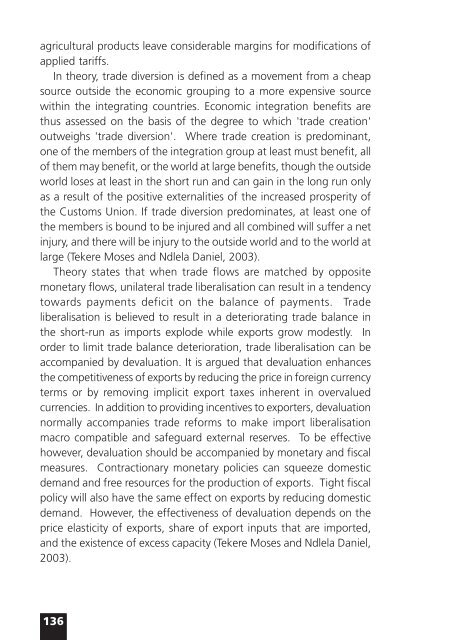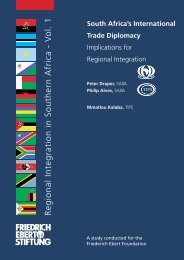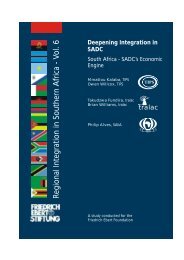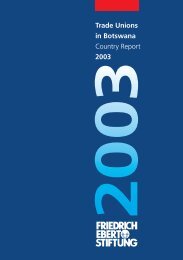Deepening Integration in SADC - Fes-botswana.org
Deepening Integration in SADC - Fes-botswana.org
Deepening Integration in SADC - Fes-botswana.org
Create successful ePaper yourself
Turn your PDF publications into a flip-book with our unique Google optimized e-Paper software.
agricultural products leave considerable marg<strong>in</strong>s for modifications of<br />
applied tariffs.<br />
In theory, trade diversion is def<strong>in</strong>ed as a movement from a cheap<br />
source outside the economic group<strong>in</strong>g to a more expensive source<br />
with<strong>in</strong> the <strong>in</strong>tegrat<strong>in</strong>g countries. Economic <strong>in</strong>tegration benefits are<br />
thus assessed on the basis of the degree to which 'trade creation'<br />
outweighs 'trade diversion'. Where trade creation is predom<strong>in</strong>ant,<br />
one of the members of the <strong>in</strong>tegration group at least must benefit, all<br />
of them may benefit, or the world at large benefits, though the outside<br />
world loses at least <strong>in</strong> the short run and can ga<strong>in</strong> <strong>in</strong> the long run only<br />
as a result of the positive externalities of the <strong>in</strong>creased prosperity of<br />
the Customs Union. If trade diversion predom<strong>in</strong>ates, at least one of<br />
the members is bound to be <strong>in</strong>jured and all comb<strong>in</strong>ed will suffer a net<br />
<strong>in</strong>jury, and there will be <strong>in</strong>jury to the outside world and to the world at<br />
large (Tekere Moses and Ndlela Daniel, 2003).<br />
Theory states that when trade flows are matched by opposite<br />
monetary flows, unilateral trade liberalisation can result <strong>in</strong> a tendency<br />
towards payments deficit on the balance of payments. Trade<br />
liberalisation is believed to result <strong>in</strong> a deteriorat<strong>in</strong>g trade balance <strong>in</strong><br />
the short-run as imports explode while exports grow modestly. In<br />
order to limit trade balance deterioration, trade liberalisation can be<br />
accompanied by devaluation. It is argued that devaluation enhances<br />
the competitiveness of exports by reduc<strong>in</strong>g the price <strong>in</strong> foreign currency<br />
terms or by remov<strong>in</strong>g implicit export taxes <strong>in</strong>herent <strong>in</strong> overvalued<br />
currencies. In addition to provid<strong>in</strong>g <strong>in</strong>centives to exporters, devaluation<br />
normally accompanies trade reforms to make import liberalisation<br />
macro compatible and safeguard external reserves. To be effective<br />
however, devaluation should be accompanied by monetary and fiscal<br />
measures. Contractionary monetary policies can squeeze domestic<br />
demand and free resources for the production of exports. Tight fiscal<br />
policy will also have the same effect on exports by reduc<strong>in</strong>g domestic<br />
demand. However, the effectiveness of devaluation depends on the<br />
price elasticity of exports, share of export <strong>in</strong>puts that are imported,<br />
and the existence of excess capacity (Tekere Moses and Ndlela Daniel,<br />
2003).<br />
136








